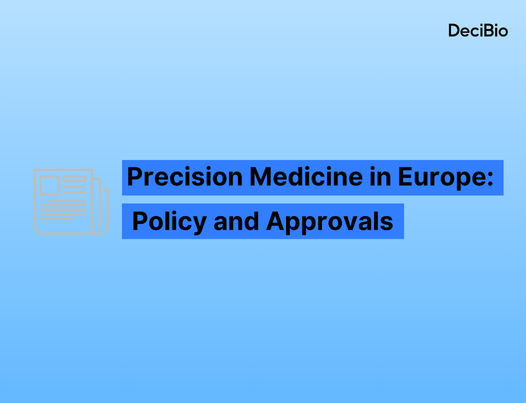Overview and Highlights (July 2025)
The third quarter of 2025 was a dynamic period for precision medicine in Europe, marked by significant government policy initiatives and a steady stream of approvals for targeted therapies. In the UK, September stood out with major policy announcements aimed at bolstering the domestic life sciences ecosystem, including a new £50 million fund for manufacturing and a national commission to accelerate the use of AI in the NHS. This policy drive was complemented by numerous approvals for targeted oncology treatments (lung, endometrial, glioma, and blood cancers) and a first-ever NHS treatment for the rare inherited eye disease LHON. However, the quarter also highlighted market access challenges, with NICE's high-profile negative recommendation for a costly Batten disease therapy and Gilead halting commercial discussions for its breast cancer drug, Trodelvy.
Across the EU, the focus was on strengthening the bloc's strategic position through international collaboration and streamlined regulation. This included establishing a new trade framework with the US impacting pharmaceuticals, forming regional health alliances like the Dutch-Danish initiative, and a major Italy-Japan cooperation pact signed at Expo 2025. Internally, the EMA and European Commission set ambitious new targets to accelerate clinical trials. On the approvals front, the CHMP recommended several novel treatments for rare and genetically-defined conditions, including Niemann-Pick disease, a specific Alzheimer's population, and a rare autoimmune disease, alongside a significant expansion for the blockbuster immunotherapy Keytruda.
United Kingdom
- UK Government Unveils £50 Million Fund to Boost Life Sciences | Policy: The government has announced a £50 million fund to help companies manufacture innovative medicines, medical diagnostics, and medtech in the UK. This investment aims to strengthen the country's manufacturing capabilities for complex products, including those used in precision medicine. (September)
- New Commission to help accelerate NHS use of AI | Policy: The UK government has established a new National Commission to advise on regulating AI in healthcare. This initiative aims to speed up the safe adoption of AI tools, such as those for radiology and pathology, which are crucial for precision diagnostics. (September)
- Hundreds of people set to benefit after life-extending lung cancer treatment given green light | Approval: NICE has recommended Imfinzi (durvalumab), a targeted immunotherapy, for adults with limited-stage small cell lung cancer (SCLC). This is the first immunotherapy NICE has recommended for this type of lung cancer. (September)
- NICE Does Not Recommend Batten Disease Treatment for Routine NHS Use | Approval: NICE has not recommended Brineura (cerliponase alfa) for routine use in the NHS for treating neuronal ceroid lipofuscinosis type 2 (CLN2), a decision impacting the 3 to 6 children newly diagnosed in the UK each year. The negative recommendation followed the manufacturer BioMarin's decision not to enter commercial negotiations with NHS England, leaving the annual list price of over £500,000 per patient too high to be considered cost-effective. The treatment had been available for six years under a Managed Access Agreement (MAA). (September)
- Vorasidenib approved for glioma with IDH1 or IDH2 mutation | Approval: Vorasidenib (Voranigo) has been approved by the MHRA for patients 12 years and older with specific types of brain tumors (grade 2 astrocytoma or oligodendroglioma) that have a susceptible IDH1 or IDH2 genetic mutation. (September)
- Lilly secures conditional MHRA approval for new blood cancer treatment | Approval: The MHRA has granted conditional marketing authorisation for Jaypirca (pirtobrutinib) for adults with relapsed or refractory mantle cell lymphoma (MCL) or chronic lymphocytic leukaemia (CLL) who have been previously treated with a Bruton's tyrosine kinase (BTK) inhibitor. (September)
- Hundreds with Rare Inherited Eye Disease to Benefit After NICE Recommends Treatment | Approval: NICE has recommended Raxone (idebenone) for visual impairment caused by Leber's hereditary optic neuropathy (LHON), a rare inherited eye disease. This is the first NHS treatment in England for this condition, and it is estimated that 250 people could be eligible. (August)
- NICE Approves First Immunotherapy Combination for Endometrial Cancer | Approval: NICE has approved the use of Keytruda (pembrolizumab) in combination with the chemotherapy drugs carboplatin and paclitaxel for primary advanced or recurrent endometrial cancer. This is the first time an immunotherapy has been combined with chemotherapy as a first-line treatment for this entire patient group, and has been shown to reduce the risk of death by 26%. (August)
- Gilead Halts Commercial Talks for Breast Cancer Drug Trodelvy in the UK | Regulation: Gilead Sciences has withdrawn from commercial discussions with NICE and NHS England for Trodelvy (sacituzumab govitecan) for certain breast cancer patients. The company stated it could not agree on a commercially viable price, leading to draft guidance not recommending the treatment and highlighting ongoing challenges with the UK's market access framework. (August)
- Thousands More Breast Cancer Patients to Benefit From New NHS Treatment | Approval: NICE approved combination therapy including ribociclib (Kisqali), a targeted therapy that blocks CDK4 and CDK6 proteins, combined with an aromatase inhibitor, for patients with HR-positive, HER2-negative early breast cancer at risk of recurrence. The recommendation now includes patients whose cancer has not spread to nearby lymph nodes. (July)
European Union
- EU and US Announce Framework for Reciprocal Trade, Affecting Pharmaceuticals | Policy: The European Union and the United States have established a framework for a trade agreement. As part of this, the US will apply only the Most Favored Nation (MFN) tariff to generic pharmaceuticals and their ingredients from the EU, and tariffs on other pharmaceuticals will not exceed 15%. (August)
- Italy and Japan Sign Cooperation Pact to Boost Life Sciences Innovation | Policy: A Memorandum of Understanding was signed at Expo 2025 in Osaka between Italy's Alisei Life Sciences cluster and Farmindustria and the Japan Bioindustry Association. The pact aims to promote joint R&D, reciprocal investments, and knowledge sharing in pharmaceuticals and biotechnology. (September)
- First treatment recommended for rare immunoglobulin-related autoimmune disease | Approval: The CHMP has recommended extending the therapeutic indication of Uplizna (inebilizumab) to include the treatment of adult patients with active immunoglobulin G4-related disease (IgG4-RD), a rare, chronic autoimmune condition. (September)
- KEYTRUDA (pembrolizumab) Gains Recommendation for Subcutaneous Administration | Approval: The CHMP granted Merck two positive opinions for: 1) an approval of a new subcutaneous route of administration for KEYTRUDA 2) a new indication for Keytruda in locally advanced head and neck squamous cell carcinoma (LA-HNSCC). (September)
- New Targets for Clinical Trials in Europe | Policy: The European Commission, Heads of Medicines Agencies (HMA), and the EMA have set new targets to enhance the clinical trial environment in the EU, aiming for faster trial start-up times as part of the Accelerating Clinical Trials in the EU (ACT EU) initiative. (September)
- Dutch-Danish Alliance to Shape Sustainable Health Policies | Policy: Denmark and the Netherlands have launched a health alliance to connect healthcare stakeholders and shape sustainable health policies, focusing on innovation, chronic disease management, and life science strategy. (August)
- New treatment for Niemann-Pick type C disease | Approval: The EMA has recommended granting a marketing authorisation for Aqneursa (levacetylleucine) for the treatment of neurological manifestations of Niemann-Pick type C (NPC) disease, a rare, progressive, and fatal genetic disorder. (July)
- Kisunla (donanemab) Recommended for Genetically-Defined Alzheimer's Population | Approval: Following a re-examination, the CHMP recommended granting a marketing authorisation for Kisunla (donanemab) for the treatment of early symptomatic Alzheimer's disease in people who do not have a copy of the ApoE4 gene, or who have only one copy. It is the second monoclonal antibody treatment to be recommended for marketing authorization by the CHMP. (July)
For more headlines from July checkout our previous newsletter!





.png)

.png)

